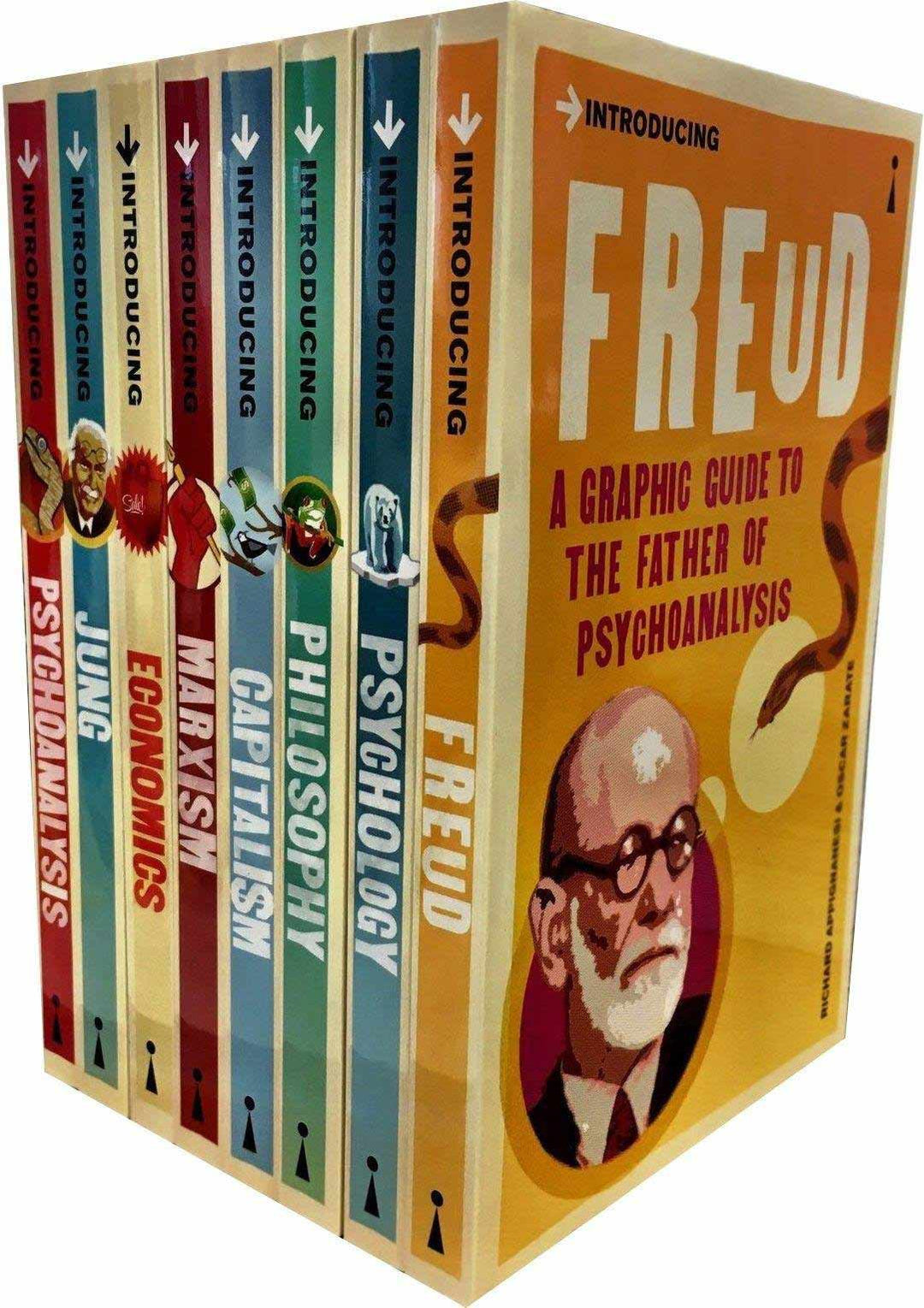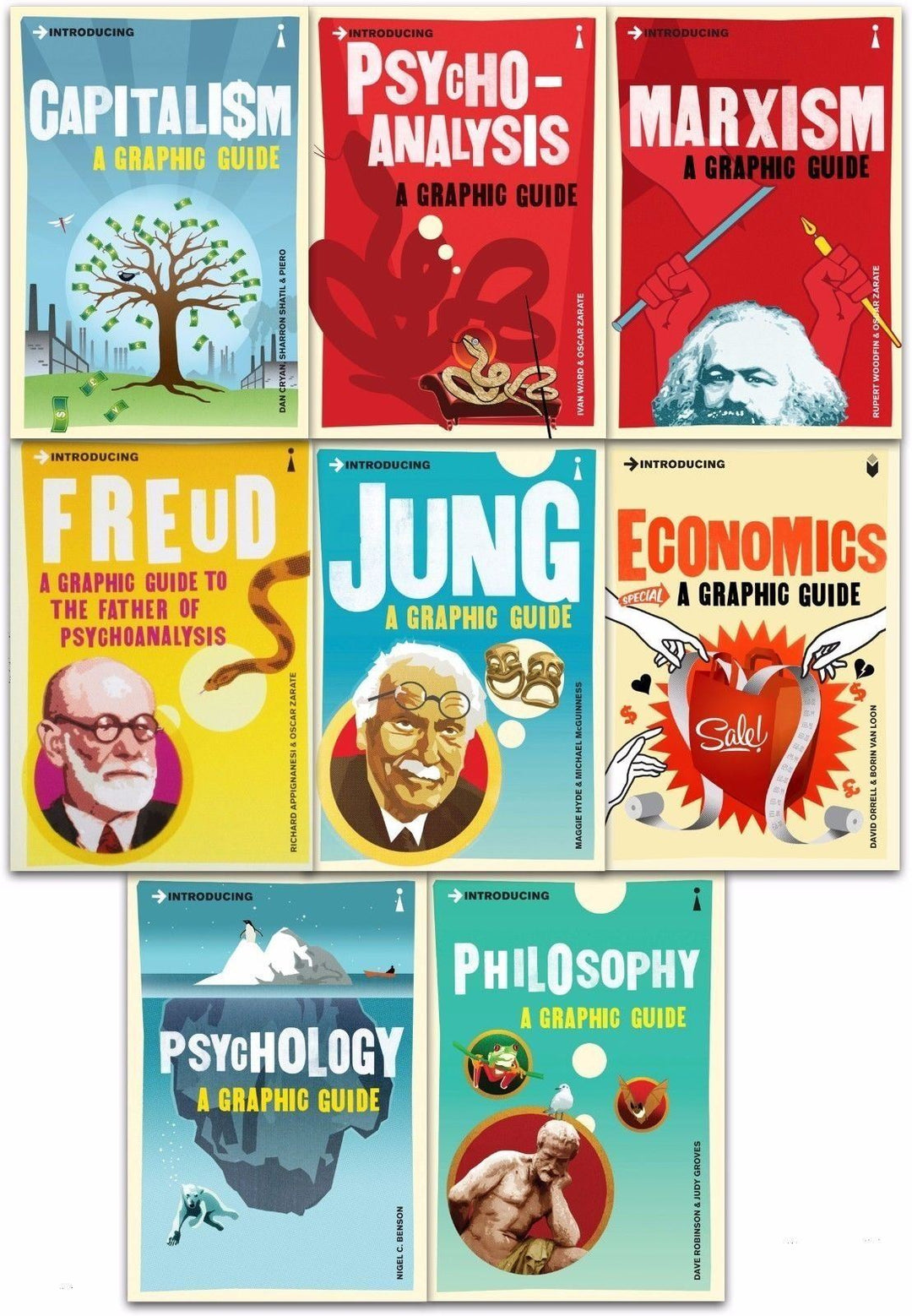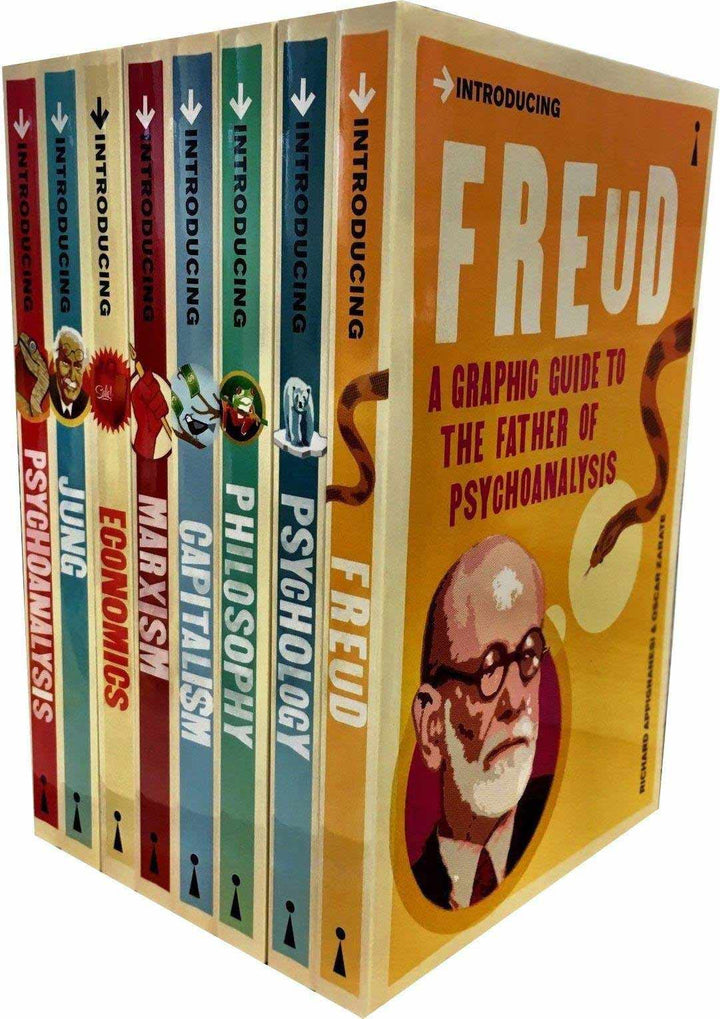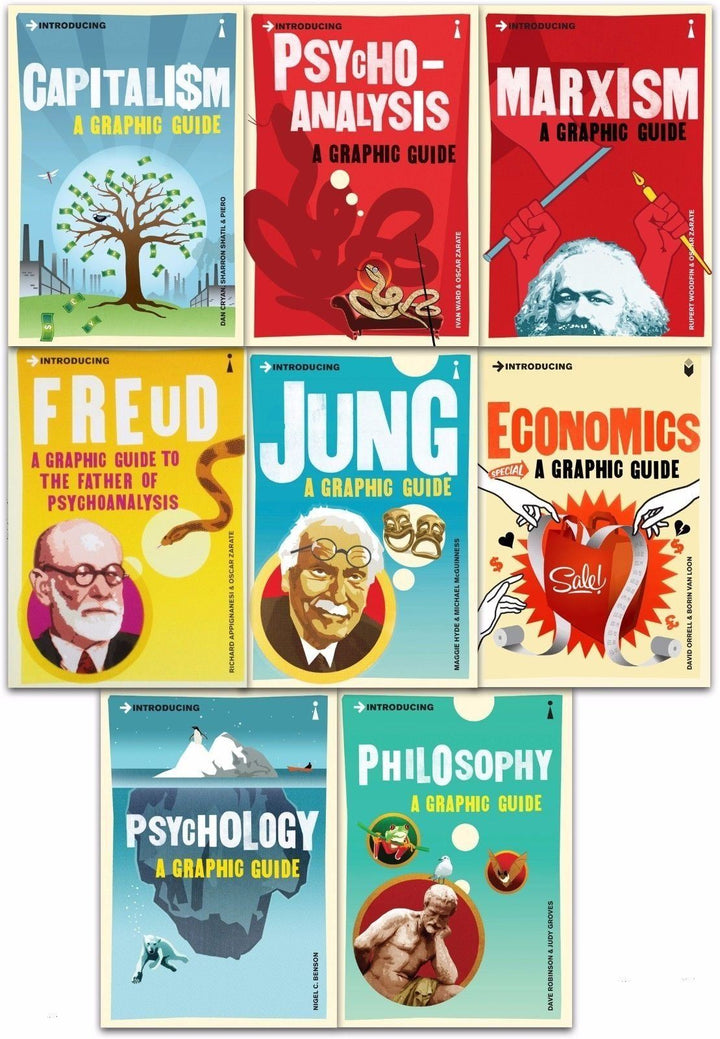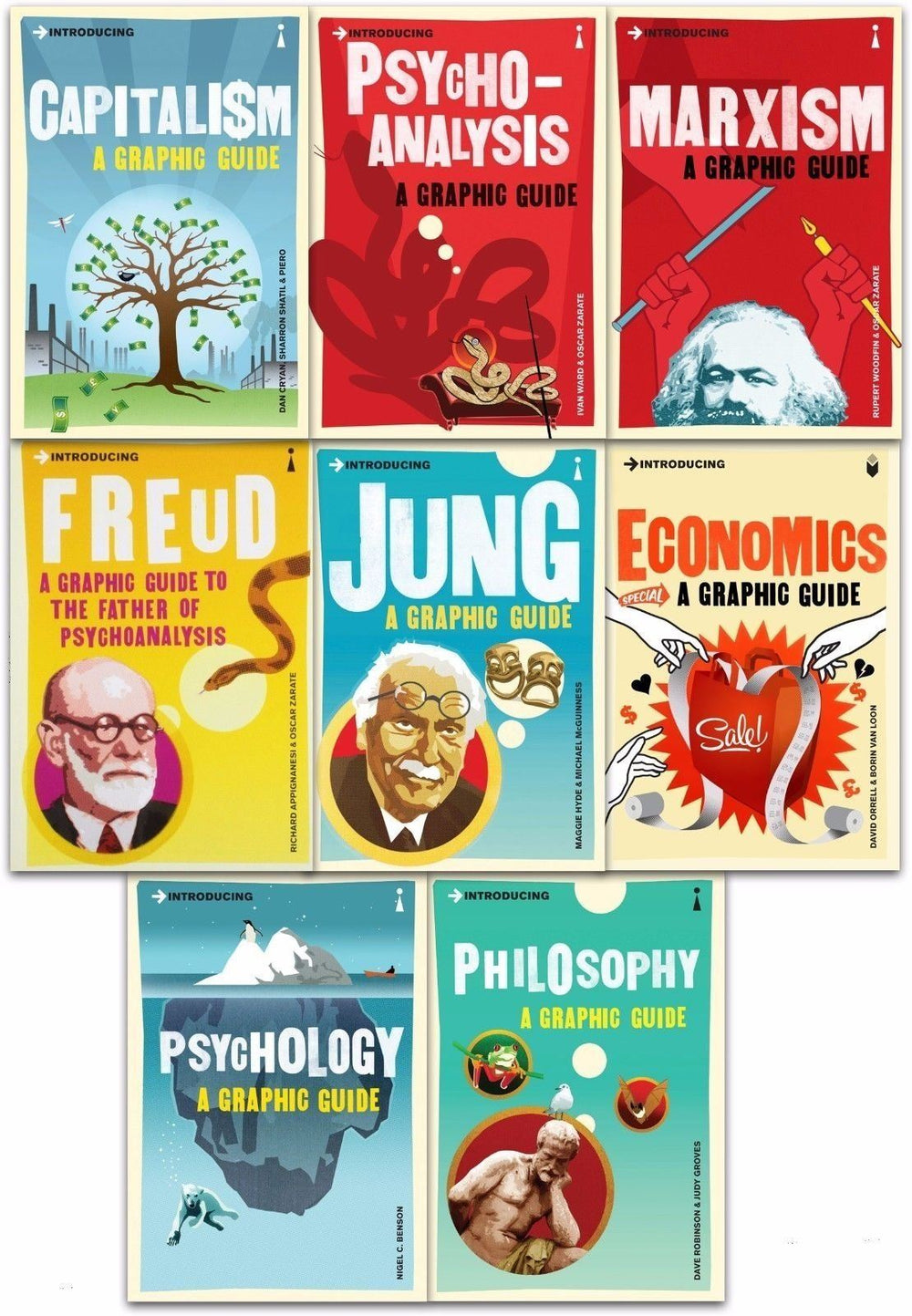Graphic Guide Introduction to Big Ideas 8 Books Collection Set - Non-Fiction - Paperback
B2D0656
- In stock, ready to ship
- Backordered, shipping soon
Titles in This Set :
Freud
Psychology
Philosophy
Capitalism
Marxism
Economics
Jung
Psychoanalysis
Description :
Freud
Freud revolutionized the way we think about ourselves. His psychoanalytic terms such as Id, Ego, libido, neurosis and Oedipus Complex have become a part of our everyday vocabulary. But do we know what they really mean? "Introducing Freud" successfully demystifies the facts of Freud's discovery of psychoanalysis. Irreverent and witty but never trivial, the book tells the story of Freud's life and ideas from his upbringing in 19th-century Vienna, his early medical career and his encounter with cocaine, to the gradual evolution of his theories on the unconscious, dreams, and sexuality. With its combination of brilliantly clever artwork and incisive text, this book has achieved international success as one of the most entertaining and informative introductions to the father of psychoanalysis.
Psychology
What is psychology? When did it begin? Where did it come from? How does psychology compare with related subjects such as psychiatry and psychotherapy? To what extent is it scientific? "Introducing Psychology" answers all these questions and more, explaining what the subject has been in the past and what it is now. The main "schools" of thought and the sections within psychology are described, including Introspection, Biopsychology, Psychoanalysis, Behaviourism, Comparative (Animal) Psychology, Cognitive Approaches (including the Gestalt movement), Social Psychology, Developmental Psychology and Humanism. The key figures covered include: Freud, Pavlov, Skinner, Bandura, Piaget, Bowlby, Maslow and Rogers, as well as many lesser-known but important psychologists.
Philosophy
Philosophers have always enjoyed asking awkward and provocative questions, such as: What is the nature of reality? What are human beings really like? What is special about the human mind and consciousness? Are we free to choose who we are and what we do? Can we prove that God exists? Can we be certain about anything at all? What is truth? Does language provide us with a true picture of the world? How should we behave towards each other? Do computers think? "Introducing Philosophy" is a comprehensive graphic guide to the thinking of all the significant philosophers of the Western world from Heraclitus to Derrida. It examines and explains their key arguments and ideas without being obscure or solemn. Lively and accessible, it is the perfect introduction to philosophers and philosophical ideas for anyone coming to the subject for the first time.
Capitalism
Capitalism now dominates the globe, both in economics and ideology, shapes every aspect of our world and influences everything from laws, wars and government to interpersonal relationships. "Introducing Capitalism" tells the story of its remarkable and often ruthless rise, evolving through strife and struggle as much as innovation and enterprise. Tracing capitalism from its beginning to the present day, Dan Cryan and Sharron Shatil, alongside Piero's brilliant graphics, look at its practical and theoretical impact. They cover the major economic, social and political developments that shaped the world we live in, such as the rise of banking, the founding of America and the Opium Wars. This book explores the leading views for and against, including thinkers like Adam Smith, Karl Marx, Theodor Adorno and Milton Friedman, together with the connections between them and their historical context. Capitalism has influenced everything in the 21st-century world. For anyone who wants to gain a broad understanding of this fascinating subject, this book cuts across narrow academic lines to analyse an all-encompassing feature of modern life.
Marxism
Was Marx himself a 'Marxist'? Was his visionary promise of socialism betrayed by Marxist dictatorship? Is Marxism inevitably totalitarian? What did Marx really say? "Introducing Marxism" provides a fundamental account of Karl Marx's original philosophy, its roots in 19th century European ideology, his radical economic and social criticism of capitalism that inspired vast 20th century revolutions. It assesses Marxism's Russian disciples, Lenin, Trotsky and Stalin who forged a ruthless dogmatic Communism. The book examines the alternative Marxist approaches of Gramsci, the Frankfurt School of critical theory and the structuralist Marxism of Althusser in the 1960s. It marshals postmodern interpretations of Marxism and raises the spectre of 'post-Marxism' in Derrida's confrontation with Fukuyama's 'end of history
Economics
Brand-new INTRODUCING guide to the subject that really makes the world go round. Economics was described by the English economist Lionel Robbins in 1935 as 'the science of scarcity' but these days economics is everywhere, and it's never been more popular - as bestselling books such as Freakanomics attest. But what is economics really all about? What do the great economists think, and what can economics do for us today? David Orrell, author of Economyths, explains all in Introducing's trademark intelligent but witty stle, accompanied by brilliant illustrations from the legendary Borin van Loon.
Jung
Carl Gustav Jung was the enigmatic and controversial father of analytical psychology. This updated edition of Introducing Jung brilliantly explains the theories that underpin Jung's work, delves into the controversies that led him to break away from Freud and describes his near psychotic breakdown, from which he emerged with radical new insights into the nature of the unconscious mind and which were published for the first time in 2009 in The Red Book. Step by step, Maggie Hyde demonstrates how it was entirely logical for him to explore the psychology of religion, alchemy, astrology, the I Ching and other phenomena rejected by science in his investigation of his patients dreams, fantasies and psychic disturbances
Psychoanalysis
INTRODUCING guide to the history and theory of still controversial 'speaking cure'. The ideas of psychoanalysis have permeated Western culture. It is the dominant paradigm through which we understand our emotional lives, and Freud still finds himself an iconic figure. Yet despite the constant stream of anti-Freud literature, little is known about contemporary psychoanalysis. Introducing Psychoanalysis redresses the balance. It introduces psychoanalysis as a unified 'theory of the unconscious' with a variety of different theoretical and therapeutic approaches, explains some of the strange ways in which psychoanalysts think about the mind, and is one of the few books to connect psychoanalysis to everyday life and common understanding of the world. How do psychoanalysts conceptualize the mind? Why was Freud so interested in sex? Is psychoanalysis a science? How does analysis work? In answering these questions, this book offers new insights into the nature of psychoanalytic theory and original ways of describing therapeutic practice. The theory comes alive through Oscar Zarate's insightful and daring illustrations, which enlighten the text.
We process our orders within 24 hours. The orders go into our warehouse to be picked, packed and where appropriate consolidated into one parcel.
Our shipping times from dispatch are as follows:
Express International (2-11 business days)
Up to 2lb: $13.99
2-3lb - $17.99
3-5lb - $24.99
5-10lb - $43.99
These shipping times are the maximum shipping periods that a purchase can take to reach our customers. Shipping may be sooner than this. Please note that where applicable, customs point clearance may affect the delivery of an order and cause a delay. This is a factor that is not in our control.
Please see this page:
https://americanbookworm.com/policies/shipping-policy


